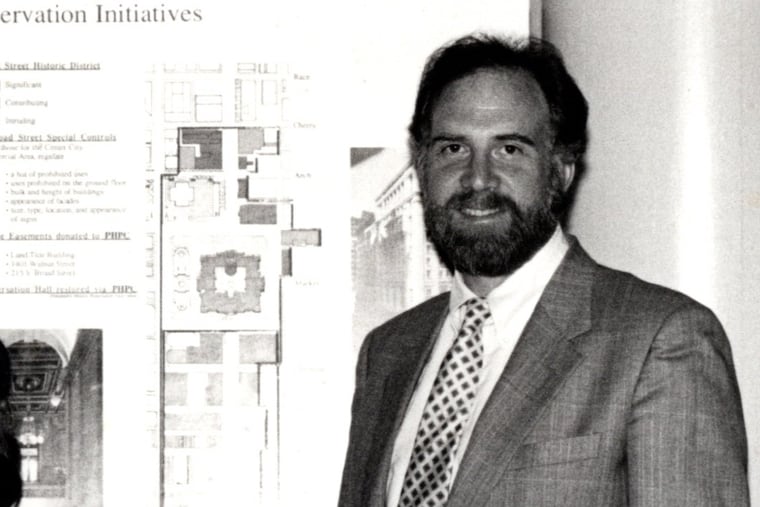William Blades, former executive vice president of the Philadelphia Historic Preservation Corp., has died at 77
One of his favorite projects was Reading Terminal Market. “We want to make sure that all this funk is preserved and not destroyed, not turned into a mall," he said.

William Blades, 77, formerly of Philadelphia, onetime executive vice president of the Philadelphia Historic Preservation Corp., former staffer at Philadelphia Development Corp., former program director at Greater Philadelphia YMCA, independent contractor, and popular sailboat captain, died Thursday, May 11, of cancer at Compass Regional Hospice in Centreville, Md.
Committed to preserving and renovating historic buildings in Philadelphia and around the region, the colorful Mr. Blades collaborated with government officials, philanthropic leaders, fellow advocates, contractors, and others in the 1970s, ‘80s, and ‘90s to protect and maintain many structures that define Philadelphia’s history. His projects included work on the Fairmount Water Works, William Penn statue atop City Hall, Reading Terminal Market, historic houses in Fairmount Park, and many notable churches.
He was outspoken and often amusingly irreverent, former colleagues said, and he told The Inquirer in 1990 that renovating Reading Terminal Market was important because: “We want to make sure that all this funk is preserved and not destroyed, not turned into a mall. … Everyone’s friendly here. Everyone talks to one another. All that had to be preserved.”
Mr. Blades criticized the media for giving more coverage to explosive demolitions than preservation efforts and wrote a 1987 letter to the editor of The Inquirer about dilapidated buildings in Fairmount Park. “We firmly believe that this, the world’s largest city park, in a city so full of heritage, deserves better than benign neglect,” he said.
Beginning in the early 1980s, Mr. Blades helped create and manage one of the most successful historic facade easement programs in the United States. He saved historic artifacts from the trash heap as an executive with Philadelphia Architectural Salvage Inc. and helped preserve religious relics and spaces through the Historic Religious Properties Program and Partners for Sacred Places.
Former colleagues called his managerial style “nurturing and strategic,” and one said: “He was very entrepreneurial and a great manager who empowered his staff to pursue their varied areas of interest in historic preservation.” Former colleague Matt Schultz said: “He was able to drive results from the teams he assembled.”
Mr. Blades worked in the 1970s as director of a YMCA residential treatment center for dependent boys and told The Inquirer in 1971 that “people just don’t listen to each other. That’s the source of all our troubles.” He also said: “I’d like the school system to do something so kids would hate to stay home.”
He went on to work as an independent contractor in Old City and began managing the Philadelphia Historic Preservation Corp. in 1982. He served on the board of directors of Reading Terminal Market and was honored for his work by the Preservation Coalition of Greater Philadelphia and officials in the administration of President Ronald Reagan.
He lived in Chestnut Hill for a time and moved to Rock Hall, Md., about 20 years ago. He captained his sailboat Tamarek in the Chesapeake Bay and served on the local municipal building advisory board, the mayor’s waterfront committee, and with other organizations.
“He was fun to be around and had a sense of humor,” said his niece Abigail Blades. “He had a wide range of interests and told great stories.”
William Stoddard Blades was born May 18, 1945. He grew up in Wayne, graduated from the Haverford School and Ohio’s Muskingum College, now Muskingum University, and served in the Army Reserve.
He raced motorcycles as a young man, collected records, and especially liked the Beatles. He married Betsy Smith, and they had daughters Jessa and Wesley, and son Ethan. They later divorced.
Mr. Blades was an adventurer and outdoorsman who fished and hiked often in the Adirondack Mountains. He paddled his canoe on countless rivers and lakes, and was known for visiting friends in Philadelphia with a long canoe strapped on top of his car. He took his dogs, Rudder and Sadie, wherever he could.
He was close to his brother, John, nieces Jessica and Abigail, nephew-in-law Scott Havens, great-nephew Tommy, and great-nieces Lizzie and Catherine. In an online tribute, friends said Mr. Blades will be “long remembered for his strong, sometimes stubborn, but always charming and lovable personality, his unique wit, and his unquestioned friendship.”
In addition to his children, brother, nieces, nephew-in-law, and former wife, Mr. Blades is survived by other relatives.
A celebration of his life is to be held later.
Donations in his name may be made to the Rock Hall Volunteer Fire Company, Box 577, Rock Hall, Md. 21661